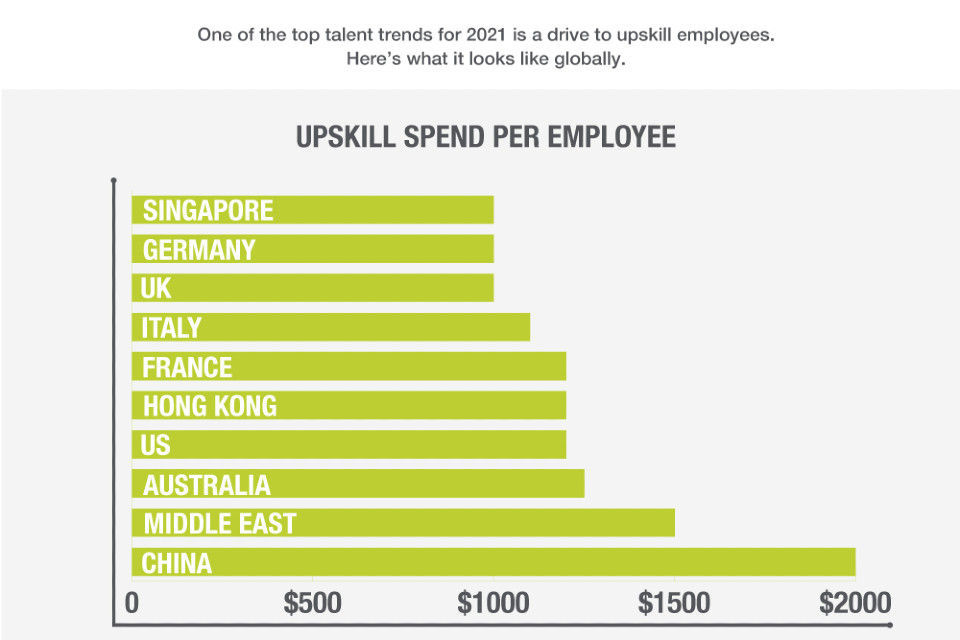While the COVID-19 pandemic felt like it was slowing down progress in the business world in many ways, it has accelerated several key developments in the workplace, which would have taken much longer without the unexpected disruption.
As the new world of work takes shape, one of the top talent trends that emerged for 2021 has been a drive to reskill and upskill employees. Comparing upskilling spend per employee and year-on-year increase, Global Workspace Specialist Instant Offices reveal the top ten countries who are focused on investing in their talent the most.
Upskilling Spend: APAC Countries Leads the Way
The countries in the table have seen a significant projected year-on-year increase in upskilling and reskilling spend per employee
This list is dominated by countries in the APAC region, which China, Australia and Hong Kong are all in the top 5.
Which Skills are Companies Prioritising?
The skills currently taking top priority when it comes to reskilling employees (i.e. those which have seen the biggest year-on-year increase) are:
- Interpersonal skills and empathy
- Project management
- Leadership and managing others
- Basic digital skills
- Adaptability and continuous learning
- Quantitative and statistical skills
- Critical thinking and decision-making
Various countries adopted temporary policies to help protect the jobs and incomes of the population by incentivising employers to retain their workers despite the financial challenges of 2020.
Wage subsidies:
The UK offered a maximum payment of £580 per employee per week via wage subsidies. Ireland provided £360 per week, while Australia paid the equivalent of £410 and Canada £500 per week.
Unemployment benefits:
For those with an initial offering in place, the UK provided claimants with an extra £20 per week, Australia paid £150 extra per week, and the US paid an extra $600 per week.
Work from home allowance:
With the sharp rise in remote working during the pandemic, more workplaces are also being encouraged to cover employees for expenses incurred while working at home (such as electricity or laptop repairs).
According to a McKinsey survey, 69% of respondents say they have seen an increase in skill-building during the pandemic, and 58% say that closing skill gaps has become a higher priority for their companies since it started. However, skill-building as a strategy is outstripping other key methods of closing skill gaps, such as hiring, contracting, redeploying and releasing.
Investment in Mental and Emotional Health
With the growing need for empathy in mind, more companies say they plan to promote long-term health goals for their employees in the future. The most popular strategies are:
- Add benefits to address mental or emotional health issues: 47%
- Enable remote and digital health-check services: 36%
- Include a mental or emotional wellbeing strategy: 33%
- Add services to address physical health issues: 29%
- Train managers to notice signs of mental health issues: 29%
As some employees try to cope with the anxiety of returning to work and others continue to navigate the emotional challenges of working remotely, more companies must start seriously investing in the wellbeing of their people.
For the full research click here: https://www.instantoffices.com/blog/business-growth/companies-investing-talent/










